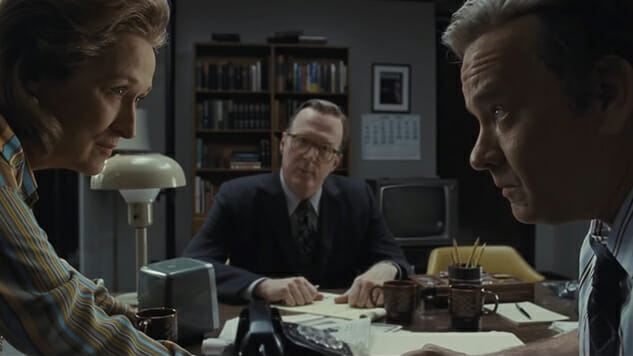The Post

The Post begins as a restrained procedural, sticking only to the facts surrounding The Washington Post obtaining, in 1972, top secret Pentagon Papers showing (without a doubt) that the American resolve for winning the war in Vietnam was severely diminished—the exact opposite mood the U.S. administration was claiming at the time. This strictly matter-of-fact approach would have made directors like Gosta Gavras and, yes, Alan J. Pakula proud.
Of course, this being a Steven Spielberg joint, The Post can’t help but gradually bring heavy emotional tension to the film’s forefront, easing us moment by moment into a fairly manipulative yet exhilarating finale. None of that should come as a surprise: “Manipulative but exhilarating” might as well be the director’s calling card.
The fact that The Post doesn’t stick to its apparent predecessors’ (All the President Men, Spotlight) dogged dedication to never clearly extracting strong emotional responses out of its audience might come across as a clear criticism of this otherwise airtight, tautly-paced drama with some of the best acting of the year. However, we are not living in subtle times.
With the rise of authoritarianism here in the U.S. severely pushing back on the first amendment, explicitly declaring the free and open press an enemy of the people, the people need a populist piece of art with the subtlety of a sledgehammer to the face. That’s why, in 2017, Spielberg is the perfect director to handle this story. Who better to rouse us, give us the passion and motivation we need to not only keep up the fight against such tyranny, but to hold out some hope for salvation as well? Depending on one’s politics, then, The Post could be the most important film of the year, or a pathetic piece of left-wing agitprop, but its effectiveness in eliciting a strong emotional response cannot be denied.
In fact, The Post works as not only a companion piece, but a prequel, to All The President’s Men, complete with a rather gratuitous end credits MCU-esque stinger teasing the upcoming “adventure.” A year before Woodward and Bernstein took down Tricky Dick, we literally follow (The Post is wall-to-wall steadicam) the struggles of Washington Post editor Ben Bradlee (Tom Hanks) and owner Kay Graham (Meryl Streep) as they fight the government for the right to publish the papers that finally tell the American public the truth about the Vietnam War. As Bradless, Graham and their team scrutinize each detail of the file, we learn more and more about egregious abuses of power, the most blood-boiling of which is the fact that the Nixon administration got to a point where they realized the war was unwinnable, but still sent thousands of soldiers to die, simply in order to save face.
As the fight between the paper and the government intensifies, Spielberg and screenwriters Liz Hannah and Josh Singer deftly investigate some complex themes. A sub-plot centered on Graham taking The Washington Post public litigates the financial side of journalism. (Is it enough to just tell the truth, or should profits be the motivating factor? Of course these days, we know the answer.) Another sub-plot delicately approaches the possible quandary of conflicts of interest between the journalist and subject: A central conflict of the film revolves around Graham’s friendship with Secretary of Defense Robert McNamara (Bruce Greenwood and his trademark growl), who’s knee-deep in the Pentagon Papers controversy. Of course, it’s an easy move to dismiss Graham as a puppet of the powerful, but Spielberg and Streep dig deep to extract the empathy needed to study the intricacy of her situation.
The ensemble cast, some of which are unusual but valuable choices (this is the drabbest default Mr. Show reunion ever, as both Bob Odenkirk and David Cross play reporters integral to the story), all contribute to the organically evolving manic culture of a metropolitan newsroom. In All the President’s Men, Jason Robards played Ben Bradlee as the calm and collected mentor to Woodward (Robert Redford) and Bernstein (Dustin Hoffman). In The Post, he’s not the old mentor but the hero, so Hanks’s charged, pulsating inhabiting of the journalistic legend appropriately raises the stakes for the audience.
Meanwhile, Janusz Kaminski, Spielberg’s DP for almost 30 years, gets great mileage out of the aforementioned heavy reliance on steadicam, employing a fly-in-the-air approach that shifts focus between many reporters within the same shot. Of course half the cinematography budget of any ’70s-based procedural is reserved for overhead fluorescent lights, and The Post doesn’t disappoint on that end.
Make no mistake, regardless of whichever decade in which it takes place, The Post rings true about our here and now. Many lines—“If we don’t hold them accountable, who will?”; “If they can tell us what to print, then The Washington Post has already ceased to exist”; and of course “The President of the United States is taking a shit on the first amendment!”—might as well have been uttered in online thinkpieces and via TV talking heads over the course of the past three years. The real final image of the film, before the stinger, shows us with a simple but powerful dolly shot that freedom of the press is bigger than any individual. The Post is here to remind us that there is still hope.
Director: Steven Spielberg
Writers: Liz Hannah, Josh Singer
Starring: Meryl Streep, Tom Hanks, Sarah Paulson, Bob Odenkirk, Tracy Letts, Bradley Whitford, Bruce Greenwood, David Cross
Release Date: January 12, 2018 (wide)